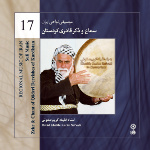
Songs
- artist:Ostâd Khalife Karim Safvati
- region:Kurdistan
- release year:2007
- style(s):Folk
- country:Iran
- formats:Audio File / Digital, CD (Compact Disc)
- record posted by:Mahoor Institute of Culture and Arts
- label:Mahoor Institute of Culture and Arts
- publisher:Mahoor Institute of Culture and Arts
- buy this record
In each culture where the Qâderiyya developed, it more or less created its own liturgy on the common basis of litanies (wird, hisb) and dhikr (zikr). Thus each group of dervishes compose devotional chants in its own tongue, and with its own rhythmic and modal structures, probably taken from an ancient secular or sacred heritage. In Kurdistan exist no less than twenty-odd clans (khânedân), all practicing chants and percussion (daf): but all agree, both profane and initiated members of other clans, that the Kasnazâni clan of Sanandaj (Iranian Kurdistan) has the most remarkable tradition of ritual chant, perhaps the most beautiful of all the Qâderi, and of similar orders, from the Near East to Central Asia.
Some sheikhs hold that, during a zikr, these souls, anong with angels, form a zikr circle above them, aligning the dervishes' invocations with their own and transforming the entire place into a space of miracle and epiphany, at which point the faithful are instilled with supernatural force endowing them with all sorts of powers. The feats they then perform are well known, having been filmed and, for the most part, verified as authentic, without any trickery: various piercing of the body (though never of vital organs), the mastication and ingurgitating of razor-blades, electric light bulbs or stones, the manipulation and sucking of red-hot iron, prolonged electric shocks, the (partial) enucleation of the eyeballs, and so on. All this occurs in the most natural way without any pain or post-effects. The sheikh just has to give his permission, usually granted to someone on a first visit wishing to attend the ceremony. Such feats are justified as proof to unbelievers that miracles exist, that the message of the Prophet and the saints is the truth and that we should follow their example (especially 'Abdolqâder).
As a matter of fact, demonstrations of this kind (frowned upon by some) are not mandatory, the essential factor being the effect of the music and the zikr on the soul. The masters affirm there is a secret to the art of daf-playing, which summons energies similar to those exploited in martial arts. Such is also thought to play the daf; in the hands of a profane, even a virtuoso, it doesn't have the same effect. An effect obtained through the spiritual disciplines (moderate but assiduous), the zeal (himmat) and the faith of the dervishes, through their taxing moral demands, and also thanks to an unbroken line of initiation passed on from the great charismatic men of the past, mystics, miracle-workers, and saints.


